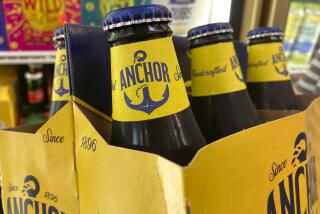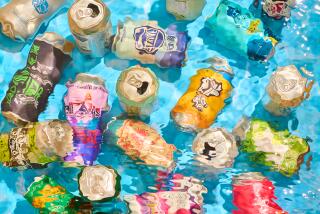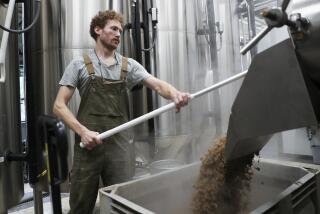Ale to the Chief!
- Share via
The 70-year-old man wearing a kilt and a tam-o’-shanter looks as if he jumped off the label of a beer bottle.
Bert Grant, founder of the nation’s first brew pub and a pioneer of the American beer revolution, isn’t worried that his Scottish attire might seem silly and cliched to the happy-hour crowd at Henry and Harry’s Goathill Tavern, and he doesn’t even mind if you’re bitter over his beer.
“It’s simple,” he said. “If you don’t like it, drink something else. I make it for me, I don’t make it for the masses. But a lot of people seem to like it as well as me. We’ve won a lot of awards with our beer.”
Grant isn’t lacking for ego. But at this Costa Mesa pub, which pours a wide selection of microbrews--including two of Grant’s ales--he isn’t lacking for admirers either. Beer lovers seem intrigued by the man who helped inspire a new generation of beer drinkers in this country. They crowd around him as he sips a pint of his Grant’s Perfect Porter and signs copies of his book, “The Ale Master,” co-written with Robert Spector, author of “The Nordstrom Way,” another movement to emerge from the Pacific Northwest.
It’s almost as if they’re paying homage to Grant for taking beer out of the dark ages and into the glory days. When Grant opened the Yakima Brewing & Malting Co. in a dilapidated opera house 16 years ago, there were no brew pubs in the U.S. and only a few microbreweries. At the time, most Americans thought Michelob qualified as a specialty brew.
Now, there are nearly 800 brew pubs and more than 1,300 specialty or craft breweries nationwide.
“I thought if enough people made enough different beers, people would go for it,” he said. “With the imports doing so well, I thought that people were ready to become accustomed to something better than Budweiser. The big breweries have always had this attitude that if you advertise your product well enough, people will drink it. The American public isn’t buying it as much anymore.”
Maybe not as much, but they are still buying mainstream--or as Grant calls them, “bland”--beers. The market share of craft breweries in the United States grew to 3% by 1995, but it has stayed there for the last three years.
“Connoisseurs have a lot more choices,” Grant said. “I think the ordinary beer drinker hasn’t changed at all. Ninety percent of the beer market is still Budweiser, Miller and Coors.”
That isn’t the case for the Pacific Northwest, where craft breweries own 22% of the market. Grant’s ales, known for their hoppy taste and fruity aroma, have been riding that wave--producing more than 20,000 barrels last year and increasing production by 102%.
Grant brews six ales year-round and several seasonal ales. His trademark style is Grant’s Scottish Ale, which he modestly calls “the world’s best ale.” He religiously drinks two pints of it a day, one at lunch and another in the evening, so as to keep the doctor away.
“I’m at the low end of the cholesterol spectrum, the low end of the blood-sugar spectrum, and I have no buildup in my arteries,” he said. “My doctor said I have the circulatory system of a 20-year-old. When I go, it won’t be because of my heart.”
But Grant admits beer has caused him plenty of heartache during his 54 years in the industry. Born in Dundee, Scotland, and raised in Toronto, Grant started tasting and brewing beer at the age of 16. As top student in his chemistry class, Grant was asked to work in the chemistry department of Canadian Breweries. About the same time, he was offered a job as an apprentice gold assayer.
“I chose beer over gold,” he proudly says in his book.
Grant spent much of his life working in the tasting and developing divisions for major breweries in Canada and the United States.
“That was a frustrating time for me,” said Grant, who worked as a consultant for Anheuser-Busch and Coors. “I’d come up with a new beer and the accountants would turn me down because it was too expensive to brew.”
Grant said Budweiser’s success is in its simplicity. “They made a beer that nobody could object to,” he said. “And then everybody else said, ‘Let’s follow them.’ ”
There are followers, too, in the microbrew industry, but Grant said they usually don’t last long.
“Too many of these brew pubs are started by people who made one or two good home brews and know nothing about making a third,” he said.
There’s little chance Grant will run out of recipes. He’s now developing cask-conditioned flavor in a bottle. Cask-conditioned beer, fresher and lower in carbonation than most, might not turn out to be a big seller, but Grant would much rather attempt to expand his and others’ beer horizons than settle for mediocrity.
Of course, Grant realizes some taste buds will never mature:
“There will always be people who like Velveeta, but I’m not one of them.”
More to Read
Eat your way across L.A.
Get our weekly Tasting Notes newsletter for reviews, news and more.
You may occasionally receive promotional content from the Los Angeles Times.










